National resilience tipped to overcome crisis
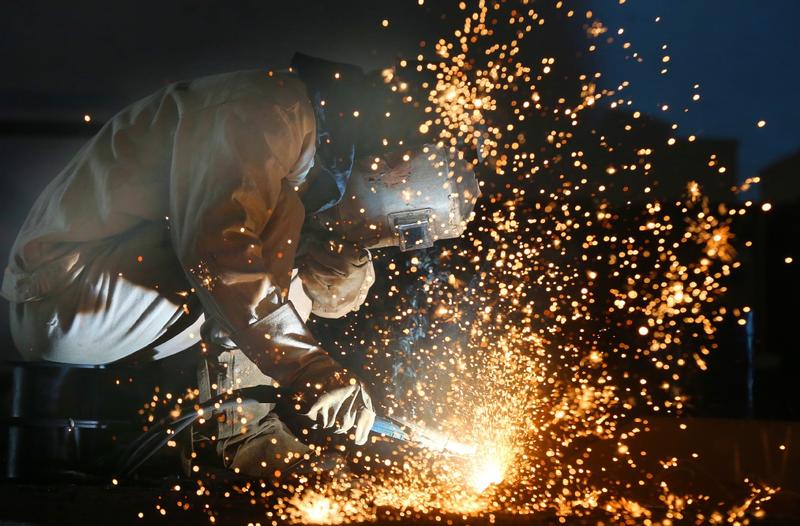 A shipbuilding factory in Nantong, Jiangsu province, in full operation. (XU CONGJUN / FOR CHINA DAILY)
A shipbuilding factory in Nantong, Jiangsu province, in full operation. (XU CONGJUN / FOR CHINA DAILY)
Editor's Note: Nations are collaborating with each other on the fight against the novel coronavirus pneumonia outbreak to control the damage to people's health and the impact on the global economy. Here, in the first part of a series titled "One World, One Fight", we look at how countries can work together.
The Chinese economy could be poised for a strong recovery in the second quarter as the nation gets back to work, according to experts.
Businesses, particularly small and medium-sized enterprises in the service sector, including shops and restaurants, have been hit hard by the novel coronavirus pneumonia outbreak as people have stayed at home.
Global markets have taken notice of the seriousness of the virus, with volatility likely to remain high for the duration of the epidemic. Once it becomes clear that the contagion is under control, both in and outside China, investor confidence should return
Jing Ulrich, JP Morgan Research vice-chairman of global banking and Asia Pacific
The extent of China's recovery may yet also depend on how badly affected the global economy is by the virus, with increasing numbers of cases, including fatalities, being reported worldwide.
JP Morgan Research, the research arm of the investment bank, is predicting that the Chinese economy will grow by 15 percent quarter-on-quarter from April to June after contracting by 3.9 percent in the first three months of this year, compared with the final quarter of 2019.
Jing Ulrich, the bank's vice-chairman of global banking and Asia-Pacific, believes such a rebound would demonstrate the core strength of the country's economy.
"China's ability to overcome the current crisis and continue with long-term plans will demonstrate national resilience," she said.
"Although the resumption of work has been slower than anticipated, we expect that economic activities will rebound from late March and into the second quarter." The first quarter has been dominated by protracted factory shutdowns, with many businesses not opening after Spring Festival, which has severely impacted global supply chains.
Last month, China's manufacturing purchasing managers index slumped to 35.7, the lowest level on record, down from a neutral 50 in January, according to data released by the National Bureau of Statistics on Feb 29.
Businesses are gradually returning to some level of normality. More than 90 percent of companies with annual revenue of more than 20 million yuan (US$2.88 million) in Zhejiang province, which is renowned for its entrepreneurial culture, have resumed operations, according to provincial government data released on Feb 28. In Guangdong province, the country's manufacturing hub, 82 percent of such companies are now up and running. Corresponding figures elsewhere are: Shanghai, 73 percent; Jiangsu province, 85 percent; Fujian province, 76 percent; and Beijing, 61 percent. The average rate of resumption nationwide stands at 67 percent.
On Feb 23, President Xi Jinping said in a speech in Beijing that there needed to be an orderly resumption of work without compromising the unremitting efforts to prevent and control the spread of the virus.
Imogen Page-Jarrett, a research analyst in Beijing for The Economist Intelligence Unit, predicts that the Chinese government will bring the virus under control by the end of this month.
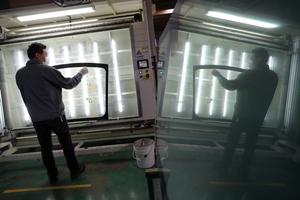 Work resumes on Wednesday at a factory in Jiangsu producing glass for windshields. (XU CONGJUN / FOR CHINA DAILY)
Work resumes on Wednesday at a factory in Jiangsu producing glass for windshields. (XU CONGJUN / FOR CHINA DAILY)
"At that point, the authorities will be able to lift quarantine measures and economic activity will begin to normalise. Factories will return to full output levels and all employees will return to work," she said.
"However, should a large-scale outbreak occur in another province outside Hubei, where the outbreak emerged, it would take longer for the authorities to manage. There is also a risk of it being reimported from countries like South Korea (the nation other than China worst affected by the virus)."
Page-Jarrett said not all sectors of the economy will have been damaged by the epidemic.
"Firms offering online services, such as gaming, education and e-commerce, are likely to see a strong pickup in their business, given that people are staying at home and spending more time on their phones," she said.
She added that many smaller companies in badly affected sectors, such as bricks-and-mortar retail, catering and accommodation, could go out of business, while larger companies will likely have the resources to overcome the crisis.
Time a key factor
Katarina Zakic, research fellow at the Institute of International Politics and Economics in Belgrade, the Serbian capital, said the strength of China's recovery would depend on how long it took to fully control the virus.
"If the outbreak is brought under control soon, then the recovery will be quicker and smoother. If it lasts longer, then the recovery will be more challenging and it will require stronger measures coming from the government," she said.
In his speech on Feb 23, Xi said that despite the setback caused by the epidemic, it was still important to strive to achieve the goals and tasks for economic and social development this year.
The country aims to become a "moderately prosperous society" and to eliminate all extreme poverty by the end of this year, in time for the 100th anniversary of the Communist Party of China next year.
To meet the first of these targets, it needs to double its 2010 per capita GDP, which would require the economy to grow this year by between 5.5 percent and 6 percent.
The target for GDP growth is traditionally set in the Government Work Report, delivered annually in early March at the opening of the National People's Congress, part of the annual two sessions political meetings. However, because of the outbreak, these two key events, which see thousands of people, including the media, descending on Beijing from around China and the world, have been postponed.
Following December's annual Central Economic Work Conference, attended by China's leaders, analysts said they expected the government to set a growth target of "around 6 percent" for this year, compared to the 6 to 6.5 percent range for last year.
Stephen Roach, a leading United States economist and senior fellow at Yale University's Jackson Institute for Global Affairs, said the Chinese economy, despite the disruption it has experienced, could still be on track.
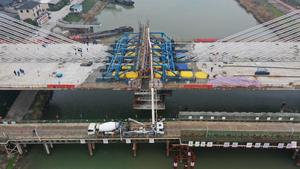 Construction of the Dongshaoxi Bridge in Deqing, Zhejiang province, nears completion on Feb 28. (WANG ZHENG / FOR CHINA DAILY)
Construction of the Dongshaoxi Bridge in Deqing, Zhejiang province, nears completion on Feb 28. (WANG ZHENG / FOR CHINA DAILY)
"China's longer-term growth and development aspirations remain very much intact, in my opinion," he said, adding that this depends on continued focus on four key factors: shifting growth from exports and investment to private consumption; rebalancing from manufacturing to services; building a social safety net; and indigenous technological innovation.
"If China stays the course with these (factors) while maintaining focus on the current deleveraging campaign in an effort to avoid a Japanese-style debt problem, its twin centenary goals remain achievable in my view," he said.
Zakic said, "Most of the planned goals are very close to being achieved, so even in a case where they are somehow narrowly not reached, it should not be considered a failure."
She said it is important to recognize the "distance the country has traveled" since the formation of the People's Republic of China in 1949.
"If we look upon extreme poverty before the establishment of the PRC, and then the advancement after reform and opening-up (in 1978) to what we have now, we can, for sure, see a great advancement in Chinese society and its economy."
Jeremy Stevens, China economist in Beijing at Standard Bank-the largest in Africa-thinks Chinese policymakers are less obsessed with the GDP figure than many assume.
"They are less concerned about growth than markets might believe. Policy measures to stem the viral outbreak are not about 'juicing' growth. Indeed, measures are proving critical in keeping China's estimated 18 million small and medium-sized enterprises afloat and limiting the impact on employment through this period of disruption," he said.
"They are leaning heavily on banks to act as a buffer against stalled business activity confronting a large swath of China's private-sector companies."
However, one of the main concerns is the impact of the epidemic on the global economy, with any downturn certain to feed back into China. On March 2, the Organization for Economic Cooperation and Development warned that the epidemic could deliver a major blow, halving its forecast for global growth this year from 3 percent to 1.5 percent.
In London, the Centre for Economics and Business Research also forecast on March 2 that the outbreak could cost the United Kingdom economy £500 million (US$640 million) a day if a major lockdown was imposed, with non-essential employees working from home.
The outbreak came at a time when the global economy was enjoying one of its longest, if still relatively anemic, upswings. However, many economists said they expected a correction at some point.
Paul Krugman, a winner of the Nobel prize in economics and author of the recently published Against the Zombies: Economics, Politics and the Fight for a Better Future, believes the virus has the potential to trigger a recession.
"Sooner or later, something will go wrong. The coronavirus could be that event, but if it isn't, something else will come along," he said.
"The big problem is lack of ammunition. Central banks don't have enough room to cut, and fiscal policy is paralyzed by ideology in much of the advanced world. So we're very vulnerable."
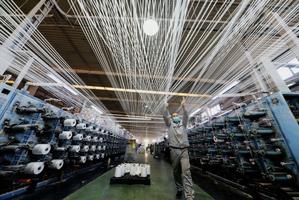 A worker checks threads at a textile factory in Qingdao, Shandong province, on Mar 2. (YU FANGPING / FOR CHINA DAILY)
A worker checks threads at a textile factory in Qingdao, Shandong province, on Mar 2. (YU FANGPING / FOR CHINA DAILY)
Roach, formerly Asia chairman of Morgan Stanley in Hong Kong as well as the investment bank's chief economist, also has concerns.
"The outbreak has come at a particularly vulnerable point in the global business cycle," he said.
Ulrich, from JP Morgan, said the epidemic has unnerved global stock markets, which remain volatile, but she believes the global economy can avoid a downturn.
"The virus has shocked the system, but hopefully growth will have a full recovery, with little to no lasting effects," she said.
"Global markets have taken notice of the seriousness of the virus, with volatility likely to remain high for the duration of the epidemic. Once it becomes clear that the contagion is under control, both in and outside China, investor confidence should return."
Some observers believe that while the outbreak is a short-term setback, it could be a major business opportunity for China, as there is likely to be major investment in drug and vaccine research to combat infections, with the potential for the country to lead the world in this field.
Emphasis is also likely to be placed on biosecurity to identify potential infections and track people's movements.
Edward Tse, CEO and founder of Gao Feng Advisory, a management consultancy, believes this could be one of the major outcomes of the crisis.
"I expect a big shift of emphasis toward so-called big health, pharmaceuticals and health services. There will be more focus on early detection and early prevention as well as diagnostics and treatment," he said.
Tse also believes that public health management will now be a key part of China's second generation of smart cities.
"Previously, the safety and security focus of these cities addressed traffic management and monitoring people's movements. There will be more interest in technology aimed at public health management and biosecurity," he said.
Andy Wynn, managing director of TTIP Consulting in the UK, which specializes in innovation, and author of The Biggest City You've Never Heard Of, a book about his experiences in China, said the crisis has brought home the critical importance of the biomedical, pharmaceutical and healthcare industries in containing future pandemics.
"There is no doubt that this situation is bringing emergency funding into the healthcare sector not only within China, but also in the European Union and the US, to rapidly develop new treatments and aftercare techniques, but more important, in terms of prevention," he said.
"The current injection of research funding must be sustained and must be part of a global collaborative effort in order to learn more about this group of pathogens and to develop effective vaccines. Just as the virus knows no borders, so our response also needs to be an international one."
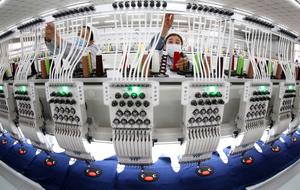 Workers operate a machine embroidering costumes in Qingdao on Thursday. (LIANG XIAOPENG / FOR CHINA DAILY)
Workers operate a machine embroidering costumes in Qingdao on Thursday. (LIANG XIAOPENG / FOR CHINA DAILY)
Economic booms
History points to economies recovering after such health crises.
David Routt, assistant professor of history at the University of Richmond in the US, has extensively researched the plagues of medieval Europe, which were often followed by economic booms.
He said the Black Death, which struck Europe in the late 1340s, also had links to China and had emerged in animal populations.
"The Black Death had profound economic consequences for late medieval Europe. Indeed, it was one of the factors that helped to dissolve the old medieval order and push Europe into early modernity," he said.
"It sped the disintegration of manorialism, the economic system where an unfree peasantry toiled in the fields for their lords. These changes cascaded throughout the medieval economy."
There was also a strong economic recovery following the outbreak of severe acute respiratory syndrome in 2003.
Ulrich, who worked in the investment field at the time, said the omens from that outbreak are cause for optimism about the current one.
"If you look at corporate earnings during the time of SARS, you had a lot of downward revisions for about three months after the peak of the outbreak, which were then followed by a fairly quick recovery," she said.
Page-Jarrett, at the Economist Intelligence Unit, said the recovery could be even stronger this time in view of the tough measures China has taken and the improvements in medical technology since the beginning of this century.
"We can expect economic growth to suffer a sharp slowdown in the first three months of the outbreak, as was the case with SARS, followed by a rebound in the following months," she said.
"Given that the Chinese government has taken stricter quarantine measures to prevent the spread of the coronavirus than with SARS, we can be optimistic that it can bring the crisis under control in a shorter time. Significant progress has also been made in medicine over the past 18 years."
Stevens, from Standard Bank, said the outbreak remains an unpredictable and rare event, which China has managed to control by taking prompt action.
"Its swift, initial containment to some extent demonstrates China's capacity for fit-for-purpose strategic solutions in times of crisis. Nearly half of China's cities and districts are currently classified as low-risk, and a return to business as usual is apparently imminent," he said.
However, Stevens added that it remains difficult to predict the eventual consequences, adding, "The situation in China and globally remains both fluid and uncertain."


